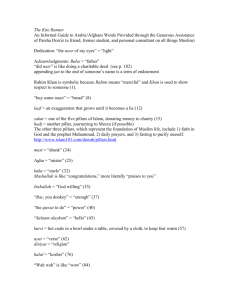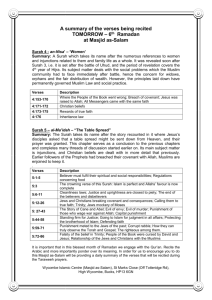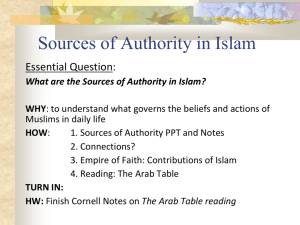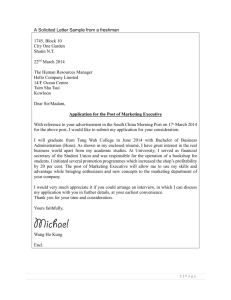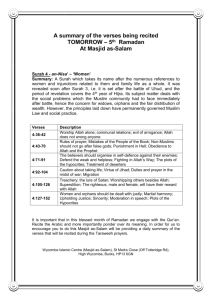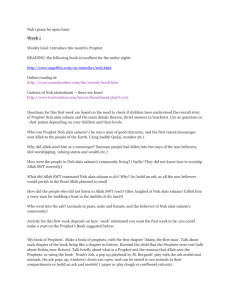Topic 5 Principles of Islamic Management
advertisement
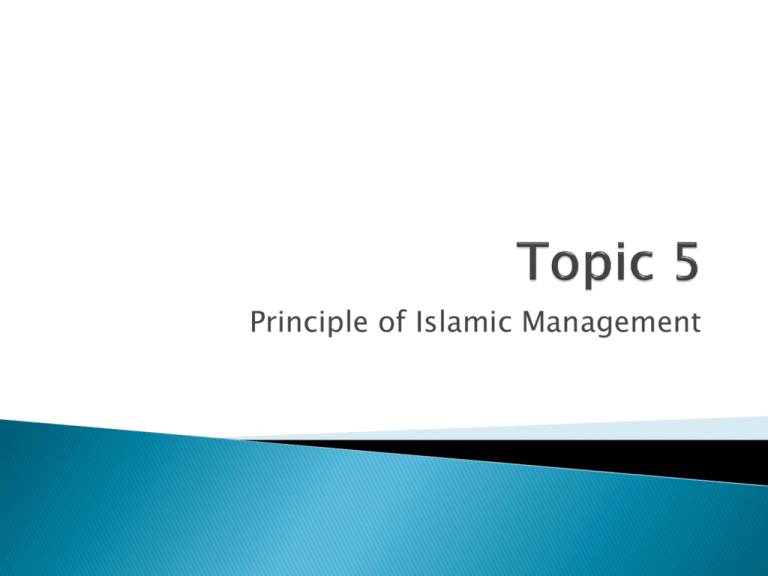
Principle of Islamic Management Da’wah literally means invitation. The preaching of Islam. Surah Fussilat (41:33) A muslim who practices da’wah is called a da’i. , the implementation of da’wah in this modern era should be managed well in order to ensure that the society accept da’wah thus, the negative image of Islam today could be eliminated. keeping the promise Trust honest Knowledge; Acting upon it; Calling to it; Being patient with the hardship encountered due to it. Indeed an incitation towards these four matters has occurred in Sooratul-’Asr: “By the time, verily man is in a state of loss. Except those who believe and perform righteous deeds, and advise each other to the truth, and advise each other to patience.” [Sooratul-’Asr 103:1-3] In order to ensure that the criteria of knowledge organisation are met, there are four aspects that should be taken into consideration by managers (Zand, 1981: 6-7) 1. Finding and disseminating knowledge that already exists in the organization 2. Acquiring and creating new knowledge 3. Converting knowledge to profitable products and services 4. Managing people who work with knowledge The Prophet Muhammad s.a.w had properly managed the knowledge for the sake of da’wah. As such, it is important for the Muslims of today to manage knowledge wisely in order to ensure that the da’wah Islamiyyah will be disseminated effectively to mankind. Leadership – by Hollander as “the process whereby one individual influences other group members towards the attainment of defined group or organizational goals. Leadership is necessary for the success of any collective work. An “Amir” as a prince/leader Verb “Umara” commanded or ordered. Khalifah – a successor or a vicegerent A leader is entrusted with leading a group of people or managing an organization. Trust and accountability Skillful and trustworthy The leader will not have absolute power because Islam necessitates participative management and check balances. Respect and consult it follower. Leaders must be role model. Possess a greater sense of responsibility. Show more care and empathy. Leader should have a vision and long term target focused on achieving it gradually. Intelligent and talented. Communication skill. - Servant of leadership Leader should be a role model Transformational leadership -who is able to inspire and motivate follower -individualized consideration. Ethical leadership -leaders who have characteristics such behavior e.g justice,freedom,consultation. Responsibilities is an obligation to do something with the expectation of a ceratin result. The vicegerent of Allah is certainly a huge responsibilty that men has assumed.Surah alahzab( 33:72) Refer to the nature of trust and responsibilities to assign task. Responsibility depends on the sphere of authority one has.Surah al-Tahrim (66:6) Create positive attitude among members of organizations. Can reduce the need of external of oversight. Intention is truly for the sake of Allah. Members of organization will be loyal and honest towards the organization. Workers will be committed to the task given. 1. Definition Participative management is the continuous involvement of people in decision making. It is an Islamic duty for a leader to consult his/her subordinates. This consultation is called in Islam Shura. Surah al-shura 42:38. It is stated in the Qur’an that the beleivers who will be rewarded in the hereafter are those who conduct their affairs with Shura or consultation. In modern management – sharing/meeting Shura is aimed at building a consensus that will benefit the community or business that has to make decision. Shura had been a culture during the time of prophet Muhammad and his successors after him. Umar’s was so keen on listening to different opinions that he was seeking the opinion of juveniles on critical matters. The culture of participation of the companions of the prophet resulted in high level of satisfaction and involvement. Those who are involved in the decision making or those who are part of consultation should seek to serve the interest of the whole organization. To draft the rules and regulation of organization. To conduct the beneficial activities of organization in line with shariah. To approve the financial program of organization. To approve contract, partneship and agreement with other organization Make better decisions based on participative decisions by members. Avoid misunderstanding and confusion Give an opportunity to group members to give and to share opinion and decision. Honesty incorporates the concepts of truthfulness and reliability and it resides in all human thought, words, actions and relationships. Islam commands truthfulness and forbids lying. God commands that a Muslim be honest. “O you who believe! Fear God, and be with those who are true (in word and deeds).” (Quran 9:119) The great scholar and ethical thinker, alMuhâsibî, once said: “For honesty to be complete, it must exist in three things. It must exist in the heart as one’s faith, it must exist in the intentions behind one’s deeds, and it must be present in the words that one speaks.” telling the truth in all situations and under all circumstances implies fulfilling the promises, whether written or given verbally, in text and spirit. implies giving an honest opinion and the right advice to the one who asks for it. implies doing one’s work as sincerely and as flawlessly as possible. implies carrying out the duties as fully and completely as possible whether the person under supervision or not. Honesty means giving every person his due and deserved rights without his asking for these rights. be doing the right thing in the right way at the right time. objectivity in judgment, objectivity in assessment, and objectivity in decisions of all types. Implies the right selection of people and the right promotion of personnel, i.e., selection by merit and promotion by merit, not by temper or favoritism or personal relationships Transparency as used in the humanity, implies openness, communication and accountability. Transparency is introduced as a means of holding public officials accountable and fighting corrupotion. Cannot cannot exist as purely one-way communication though. Quranic demands fair, open and ethical behaviour in all business transactions. Verse (2:282) For example organization and financial transparency - requires that financial transactions be made through witnesswritten contracts. Defensiveness and secrecy only contribute to fear and suspicion on both side. If we have nothing to hide, we should be able to demonstrate clearly. Calm responses to any criticism, whether or not that criticism is fair, is consistent with Qur’anic exchortations to gentle discourse, rational debate, an all the Islamic tradition of courtesy. Verse(6:125) Leader must be transparent.His intentions must be congruent with his actions.He must avoid conflict of interest, avoid abusing his position and avoid any competition with others for self-serving purposes. It is the wisdom of God the Almighty that make some people rich and others poor, to help each other in matters of their livelihood, and helping them to worldly matters, and comforted. The most important forms of cooperation and beautiful is the cooperation of all of the gathering one task to accomplish this task to the fullest with careful what pleases God. This was the concept of the Prophet, peace be upon him when he sent Maaz and Abu Musa, may Allah be pleased to Yemen, where he said: “Yusra nor Tbeefa, and human beings nor Tnfra, Ttauawa not differ from” certified messenger of Allah upon him. That commandment Prophet Muhammad came to reach the role of cooperation and its meaning in the completion of all works and functions, where the auxiliary inherited love and bonding and closeness between individuals. cooperation means tender in all directions and all circumstances, which is sharing a public service and participation of all people to access noble goal and noblest goals, what was keeping religion and life, honor and money and mind, achieving security and faith. - (نية بحسنGood faith) Deal with monitaring and controlling. It refers to achieve vision & mission of the organization. The correct intention to make correcttion and also by doing participative decision making. Out of all of God’s creatures, man is the most honored. To improve inwardly and outwardly is man’s responsibility towards himself and towards God, exalted is He. Here is how to be a stronger believer committed to improving your own self, life and community (قناعةContentment) - is accepting whatever comes to one or is given to him. refer to satisfaction and happiness in an absolute and unrestricted way. - As for the difference between contentment and stinginess, contentment is, more or less, used to signify individual morality and it has to do with making good use of available means and facilities in your life and avoiding extravagant and excessive use of divine bounties, though they might be little. - Thus stinginess, which relates to social morality, is the reluctance or unwillingness to share something with others where and when he must use his wealth or assets in order to meet the needs of fellow human beings in society. Maslaha (Arabic ' ,مصلحةpublic interest') is a concept in traditional Islamic Law. It is invoked to prohibit or permit something on the basis of whether or not it serves the public's benefit or welfare. The concept is related to that of Istislah. While the meaning of maslaha is 'public interest', the meaning of istislah is 'to seek the best public interest.
